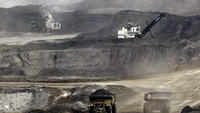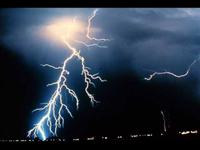-
Capturing CO2 directly from air is chemically, economically viable
With a series of papers published in chemistry and chemical engineering journals, researchers from the Georgia Institute of Technology have advanced the case for extracting carbon dioxide directly from the air using newly developed adsorbent materials
-
-
Pulling CO2 from air feasible, if still costly, way to curb global warming
Emerging techniques to pull carbon dioxide from the air and store it away to stabilize the climate may become increasingly important as the planet tips into a state of potentially dangerous warming; lower-cost technology is a stumbling block so far
-
-
Temperature rise, CO2 follow each other closely
The greatest climate change the world has seen in the last 100,000 years was the transition from the ice age to the warm interglacial period; new research indicates that, contrary to previous opinion, the rise in temperature and the rise in the atmospheric CO2 follow each other closely in terms of time
-
-
Replacing coal with natural gas would reduce global warming
A new study finds that a gas substitution scenario, in which natural gas replaces all coal power production and any new oil-powered facilities by midcentury, would realize 40 percent of the reduction in global warming that could be achieved with a full switch to low-carbon fuel sources; this is a less costly, and more feasible, option, than switching all electricity generation immediately and aggressively to non-fossil fuel sources such as solar, wind, and nuclear
-
-
Per capita CO2 emissions in China reach EU levels
Global emissions of carbon dioxide (CO2) increased by 3 percent last year; an estimated cumulative global total of 420 billion tons of CO2 has been emitted between 2000 and 2011 due to human activities, including deforestation; scientists suggest that in order to limit the rise in average global temperature to 2°C above pre-industrial levels, cumulative CO2 emissions in the period 2000–50 cannot do not exceed 1,000 to 1,500 billion tons
-
-
Studies of nuclear weapons make a contribution to climate science
Nuclear weapons testing may at first glance appear to have little connection with climate change research, but key cold war research laboratories and the science used to track radioactivity and model nuclear bomb blasts have today been repurposed by climate scientists
-
-
Will rising temperatures lead to rising crime rates?
General Strain Theory has become one of the leading explanations for crime, and Emory University’s Professor Robert Agnew, has become its chief architect; he argues that rising temperatures will lead to more strains — increased temperatures, heat waves, natural disasters, serious threats to livelihood (farming, herding, fishing), forced migrations on a massive scale, and social conflicts arising as nations and groups compete for increasingly scarce food, fresh water, and fuel – and more strains invariably lead to rising crime rates
-
-
Emissions from oil sands-derived fuels too varied for uniform low-carbon standards

Policy makers need to be cautious in setting new low-carbon standards for greenhouse gas emissions for oil sands-derived fuels as well as fuels from conventional crude oils; researchers found that lifecycle greenhouse gas (GHG) emissions vary widely across both actual surface mining and in situ oil sands operations and conventional crude cases reported in the scientific literature, depending on individual project operating conditions, technology used, and other factors
-
-
Environmental changes lead stressed cows in southern U.S. to produce less milk

Researchers found that the decline in milk production due to climate change will vary across the United States, since there are significant differences in humidity and how much the temperature swings between night and day across the country; for instance, the humidity and hot nights make the Southeast the most unfriendly place in the country for dairy cows
-
-
Explaining 2011 extreme weather events

2011 will be remembered as a year of extreme weather events, both in the United States and around the world; NOAA says that every weather event that happens now takes place in the context of a changing global environment; a comprehensive annual report – State of the Climate in 2011 — provides scientists and citizens with an analysis of what has happened so organizations and individuals can prepare for what is to come
-
-
Changing climate to lead to fewer, but more violent, thunderstorms

Researcher predict that for every one degree Celsius of warming, there will be approximately a 10 percent increase in lightning activity; this could have negative consequences in the form of flash floods, wild fires, or damage to power lines and other infrastructure
-
-
Natural gas is good for the economy, environment
No matter how we drill it, using natural gas as an energy source is a smart move in the battle against global climate change and a good transition step on the road toward low-carbon energy from wind, solar, and nuclear power
-
-
A 10-year plan for Europe’s grid
A new study shows that 104 billion euro over ten years need to be invested in the refurbishment or construction of roughly 52,000 km of extra high voltage power lines and cables across Europe in order to add 3 percent generation capacity and the reliable integration of 125 GW of renewable energy sources
-
-
A record: half of U.S. land area is in various stages of drought

Analysis of the latest drought monitor data revealed that 46.84 percent of the U.S. land area is in various stages of drought, up from 42.8 percent a week ago; previous records were 45.87 percent in drought on 26 August 2003, and 45.64 percent on 10 September 2002; looking only at the forty-eight contiguous states, 55.96 percent of the country’s land area is in moderate drought or worse — also the highest percentage on record
-
-
Students and scientists gather in Singapore to discuss water problem
International university students and water experts have converged at Singapore’s Nanyang Technological University (NTU) to foster an intellectual and research community on a scarce natural resource — water
-
- All
- Regional
- Water
- Biometrics
- Borders/Immig
- Business
- Cybersecurity
- Detection
- Disasters
- Government
- Infrastructure
- International
- Public health
- Public Safety
- Communication interoperabillity
- Emergency services
- Emergency medical services
- Fire
- First response
- IEDs
- Law Enforcement
- Law Enforcement Technology
- Military technology
- Nonlethal weapons
- Nuclear weapons
- Personal protection equipment
- Police
- Notification /alert systems
- Situational awareness
- Weapons systems
- Sci-Tech
- Sector Reports
- Surveillance
- Transportation
Advertising & Marketing: advertise@newswirepubs.com
Editorial: editor@newswirepubs.com
General: info@newswirepubs.com
2010-2011 © News Wire Publications, LLC News Wire Publications, LLC
220 Old Country Road | Suite 200 | Mineola | New York | 11501
Permissions and Policies
Editorial: editor@newswirepubs.com
General: info@newswirepubs.com
2010-2011 © News Wire Publications, LLC News Wire Publications, LLC
220 Old Country Road | Suite 200 | Mineola | New York | 11501
Permissions and Policies
